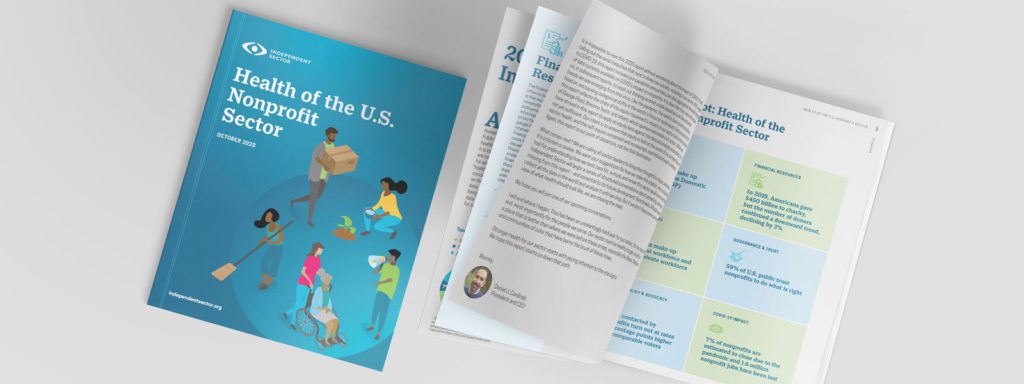Nonprofits remain a transformative force in supporting communities of all backgrounds and ensuring that everyone in the U.S. can thrive. To reach that goal, we need a better framework to understand and improve the nonprofit sector’s overall health. In the end, communities will benefit because they’ll be stronger for residents.
As part of this effort, Independent Sector hosted a series of focus groups in February to explore data-driven guidelines that identify a “healthy” nonprofit sector. The focus groups were part of our follow up to our first annual Health of the U.S. Nonprofit Sector report, which we released in 2020.
While we aggregated plenty of data on the sector’s health, we realized there is little consensus about how healthy we are based on it. Think of it this way: When doctors measure vital signs, they diagnose the status of their patients’ well-being by comparing their findings against an accepted “healthy” range. Yet, the nonprofit sector doesn’t have shared guidelines for what constitutes good, fair, or poor sector health:
- Is $450 billion in annual charitable donations a healthy number?
- What about the fact that 22% of nonprofit board members are people of color in a nation in which they make up more than 40% of the population?
- There’s agreement that this is not a healthy current state, but to what target should we aspire?
A set of consensus “health guidelines” or “targets” could help galvanize the sector around shared goals for a stronger sector and help us understand how much work is needed to get there.
What Happened?
Independent Sector issued an open call to the sector to join focus groups on developing draft health targets. Twenty-seven nonprofit leaders provided feedback in four focus groups centered around various areas of sector health: Financial Resources, Human Capital, Governance and Trust, and Public Policy and Advocacy. Leaders considered questions like:
- “How do we know the sector is healthy?”
- “How does equity relate to sector health?”
- “Which indicators are most meaningful for communicating health?”
Leaders considered key variables in each area that could make powerful targets — ranging from total charitable giving and months of cash on hand, to the percentage of Black, Indigenous, and People of Color (BIPOC) nonprofit staff and leadership, and the extent to which nonprofit boards participate in issue advocacy.
What Did We Learn?
Unsurprisingly, we learned that leaders hold diverse views about nonprofit sector health and how to measure it, among the reasons IS sought outside input in the first place. It’s difficult to narrow down a few indicators that capture the complexity of nonprofit health, even within one focus area. Still, participants recognized the power of having benchmarks and the critical role of capturing equity. Most regularly reported, representative sector data captures diversity or inclusion; but it remains unclear the extent these variables capture how equity factors into health. One difficulty that arose related to understanding equity is measuring the sector’s impact.
Many have tried (or are trying), although none have yet succeeded to define a sector-wide impact measurement, which is why impact data doesn’t appear in the current health report. And yet, participants noted the importance of understanding health in the context of delivering on mission and positively impacting communities. One area IS hopes to explore further is the relationship between health, equity, and community voice in decision making – which spans several areas of sector health.
What’s Next?
Independent Sector will use focus group feedback to continue developing and testing potential health guidelines or targets. We look forward to engaging our partners in the academic and research community, using existing data and research to inform our work. We also are working closely with research and data partners to identify opportunities to strengthen the sector’s data infrastructure. This work is important and complex. It aims to create a stronger data ecosystem, enabling the sector to access more regularly reported and representative data to inform our understanding of health and equity.
Given the importance of how nonprofits support the country, we look forward to engaging IS members and sector leaders as this work continues. Have questions or suggestions related to sector health? Feel free to contact me at mariel@independentsector.org.



